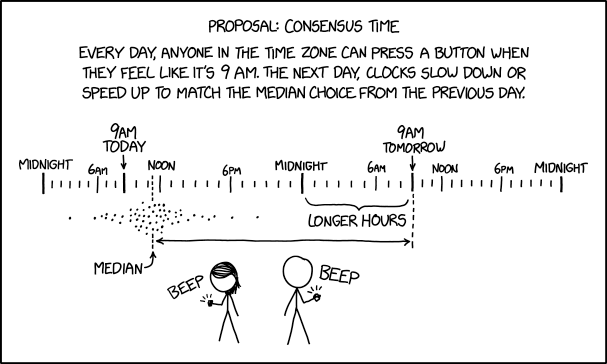Consensus Time

Now, you may argue that the varying hour lengths and feedback effects would cause chaos. To which I say, yeah, and I'm also curious to see how the weekday cycle interacts with it! So, you in?

Now, you may argue that the varying hour lengths and feedback effects would cause chaos. To which I say, yeah, and I'm also curious to see how the weekday cycle interacts with it! So, you in?
Daylight Saving Time, a recurring theme on xkcd, has recently started (in the US, as of this comic's publication). At the time of transition, clocks in (most of) North America are turned an hour forward. People frequently complain about the switch into (and out of) DST, due to it having been invented for the no-longer-relevant cause of saving coal during wartime. One of many complaints is that it will still "feel" like 5 am at 6, or whatever other case. A few days before this comic went up, the United States Senate unanimously passed the Sunshine Protection Act, a proposed law which would permanently abolish the biannual daylight savings adjustment, setting (what was) the local daylight savings time offset as the year-round time zone for all but a handful of states and territories rather than eliminating DST completely. This bill still needs to be debated and passed by the House of Representatives and then signed by the President.
Randall, jumping on this topic, proposes a system that allows everybody to say when it "feels" like 9 am, and then the median 9 am will become the real 9 am. This happens every day. As the title text points out, this would be chaotic and, to put it bluntly, awful.[citation needed]
Presumably the times indicated on this diagram are as the clocks in this time zone would indicate, as opposed to an "ordinary" reference time.
The graph of points seems to follow a normal distribution, with a large number of votes being clustered around a given time, and giving a median of soon after 11AM. There are some extreme outliers, some before 6AM and some after 6PM, indicating some users being outside the normal range but no information on whether it's a malicious attempt.
Although the hours between midnight and 9 am are labelled as "longer" (which we can assume means each would take longer than an hour of ordinary time to pass) the effect on the remaining hours is left unstated. If we assume that the remaining hours pass at the usual rate then this would suggest that midnight would come sooner or later than normal and hence the next vote would occur sooner or later respectively. This implies the time in this time zone could drift further than a day (or even multiple days) from existing time-zones which could be what is meant by "feedback", "chaos" and the effect on weekdays mentioned in the title text.